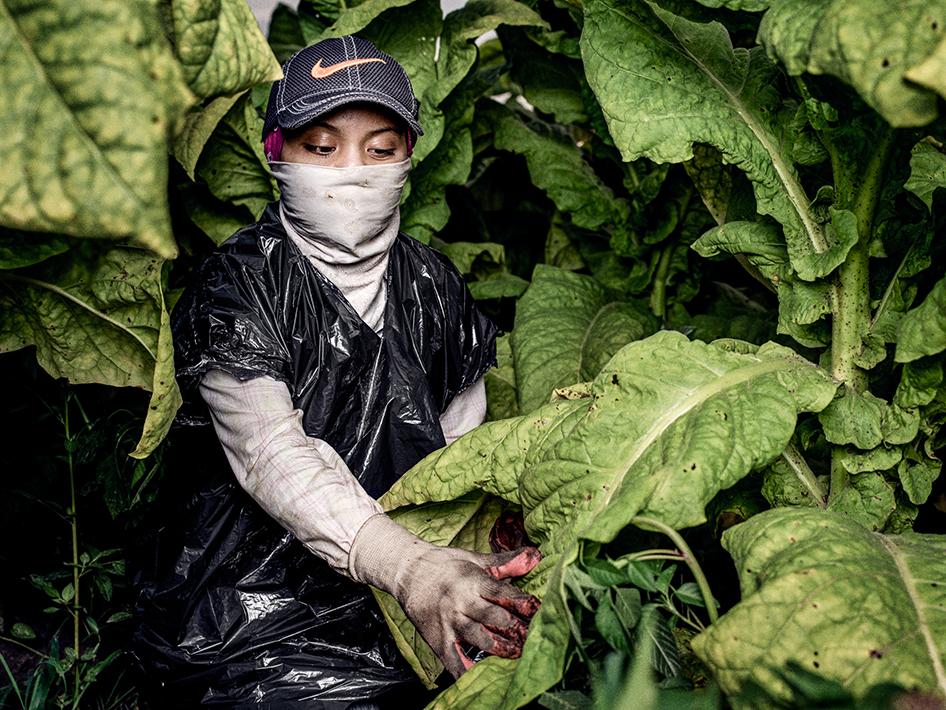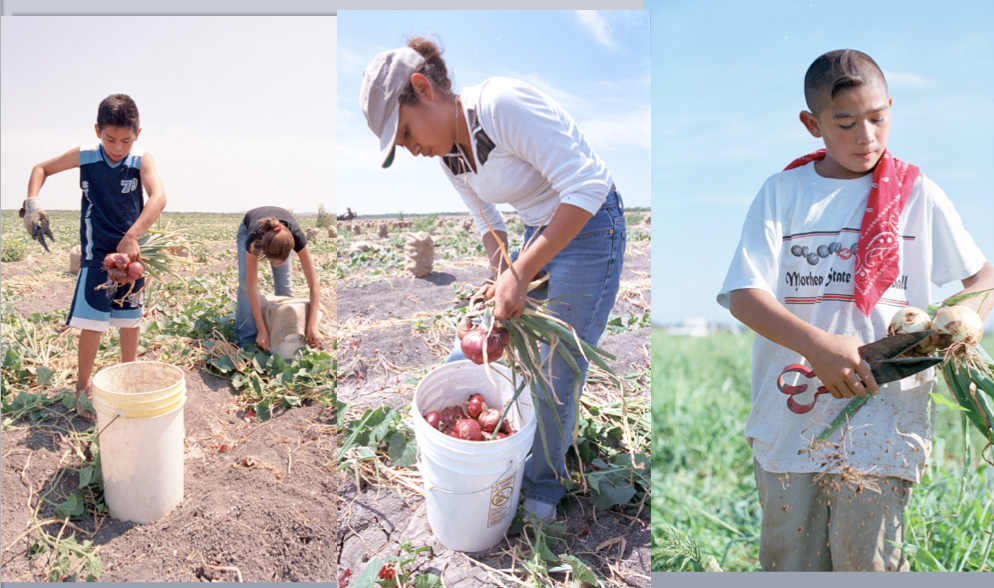Child Labor Coalition Press Release: 110 groups urge President Obama to enact an immediate ban on child labor in U.S. tobacco
For immediate release: August 3, 2016
Contact: Reid Maki, Child Labor Coalition, (202) 207-2820, reidm@nclnet.org
Washington, DC—A letter signed by 110 groups, representing tens of millions of Americans, is urging President Obama to protect the most vulnerable workers in America by banning child labor in U.S. tobacco before he leaves office. “Children should not be harvesting a crop that routinely makes them sick from nicotine poisoning,” said Sally Greenberg, co-chair of the Child Labor Coalition (CLC) and the executive director of the National Consumers League. “In 2012, under strong pressure from the agriculture lobby, the Obama administration withdrew long-overdue occupational protections for child farmworkers that would have banned child labor in tobacco while providing a host of life-saving protections. We call on President Obama to rectify this decision and at last protect child tobacco workers from the dangers of nicotine poisoning.”
Consistent with our efforts, on May 5, the Federal Drug Administration announced new regulations prohibiting the sale of e-cigarettes to children. In announcing the new regulations, the Secretary of Health and Human Services Sylvia Mathews Burwell stated, ‘We’ve agreed for many years that nicotine does not belong in the hands of children.” Despite this concern, the Obama Administration has not yet taken appropriate steps to protect child tobacco workers from nicotine poisoning in the fields.
“If Brazil and India can ban child tobacco work, the U.S. can too,” said Norma Flores López, chair of the CLC’s Domestic Issues Committee. “We call on the Obama Administration to take action on behalf of powerless child tobacco workers because it is the right thing to do. Weak child labor laws in U.S. agriculture make protecting child tobacco workers especially critical.”
“A 12-year old can work 50 or 60 hours a week on a U.S. tobacco farm – as long as it’s not during school hours – and it’s perfectly legal,” said Jo Becker, Children’s Rights Advocacy Director at Human Rights Watch, which produced the ground-breaking study Tobacco’s Hidden Children –Hazardous Child Labor in United States Tobacco Farming in May 2014. “Before the end of his term, President Obama should take action to ban this hazardous work for children.”
“The health reasons for such a child-labor ban are incontrovertible,” said Karen Mountain, RN and chief executive officer of Migrant Clinicians Network. “In U.S. tobacco fields, workers of any age are susceptible to green tobacco sickness, an acute nicotine poisoning from handling tobacco plants, which results in vomiting, nausea, headaches, and dizziness. Children may be even more susceptible to green tobacco sickness, due to their smaller body size.” Long-term effects of this type of nicotine exposure are unclear, although smoking tobacco during adolescence is well known to cause numerous adverse long-term health effects including cancer, noted Mountain.
“Children performing hazardous work in U.S. tobacco fields are a particular concern,” said Dr. Lorretta Johnson, Secretary-Treasurer of the American Federation of Teachers, co-chair of the CLC. By allowing children to do this dangerous work at ages as young as 12, “the U.S. is in violation of U.N. Convention 182, which seeks to eliminate the worst forms of child labor. The President can act to protect these children by closing the door to dangerous work. We want to help children succeed in school, not make them sick from nicotine poisoning and exhausted from back-breaking labor in tobacco fields.”
Over the last two years, the tobacco industry has adopted stronger polities to address child labor concerns. The two largest tobacco-growing associations, as well as the two largest U.S.-based tobacco companies, including Philip Morris International, have stated that they would welcome stronger regulations to back up their voluntary policies. Many in the non-profit community doubt the capacity of the industry to monitor its fields.
The NGO tobacco sign-on letter asks the Obama administration to collect better data on the prevalence of child labor and to conduct targeted enforcement of labor practices to make sure current law is not being broken and both child and adult workers receive the labor protections they are due.
“The tobacco industry itself recognizes the potential harm to children working tobacco so we don’t believe a ban would elicit a strong backlash from the agricultural community,” said Reid Maki, NCL’s director of child labor advocacy. “A 12-year-old can’t smoke, the public understands that a minors should not be absorbing nicotine and getting poisoned while harvesting a crop that has killed millions of Americans.”
###
About the Child Labor Coalition
The Child Labor Coalition, which has 37 member organizations, represents consumers, labor unions, educators, human rights and labor rights groups, child advocacy groups, and religious and women’s groups. It was established in 1989, and is co-chaired by the National Consumers League and the American Federation of Teachers. Its mission is to protect working youth and to promote legislation, programs, and initiatives to end child labor exploitation in the United States and abroad. The CLC’s website and membership list can be found at www.stopchildlabor.org.


 The health risks tobacco farm workers face are considerable, leaving workers vulnerable to heat stroke and green tobacco sickness. The majority of these workers are seasonal/migrant workers who have little access to mechanisms that would hold growers accountable for conditions in the fields, and often few options but to bring children to work. The health consequences of tobacco work are worse for children than they are for adults, because children’s smaller bodies absorb proportionately more nicotine than adults. There are long-term developmental repercussions as well. Children who work in direct contact with tobacco leaves risk acute nicotine poisoning, and may experience symptoms including vomiting, nausea, headaches and dizziness. A widely-reported 2014 study by Human Rights Watch found that the majority of the 141 child tobacco workers interviewed had experienced the sudden onset of symptoms consistent with nicotine poisoning while working in fields of tobacco plants and curing barns in North Carolina, Kentucky, Tennessee and Virginia.
The health risks tobacco farm workers face are considerable, leaving workers vulnerable to heat stroke and green tobacco sickness. The majority of these workers are seasonal/migrant workers who have little access to mechanisms that would hold growers accountable for conditions in the fields, and often few options but to bring children to work. The health consequences of tobacco work are worse for children than they are for adults, because children’s smaller bodies absorb proportionately more nicotine than adults. There are long-term developmental repercussions as well. Children who work in direct contact with tobacco leaves risk acute nicotine poisoning, and may experience symptoms including vomiting, nausea, headaches and dizziness. A widely-reported 2014 study by Human Rights Watch found that the majority of the 141 child tobacco workers interviewed had experienced the sudden onset of symptoms consistent with nicotine poisoning while working in fields of tobacco plants and curing barns in North Carolina, Kentucky, Tennessee and Virginia.

